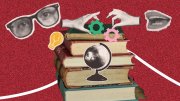Hired in 2003 to build the capacity of Harvard’s African languages program (last spring it offered 21 of them, more than any other university in the world), John Mugane, professor of the practice of African languages and cultures, soon noticed a category of students who picked up one tongue after another without much difficulty, traipsing glibly among language families, from Nilotic to Bantu to Khoisan. After keeping a close eye on these polyglot students for several years, Mugane is writing a set of annotated language-learning textbooks based on their habits. (Igbo, spoken in Nigeria, is the first test case.) The skills, which he will summarize in a separate book, Learning How to Learn Languages, include repetition, note-taking (particularly writing down new phrases one hears in conversation), listening for idiomatic turns of phrase, and focusing on utility rather than flawless grammar. A capacity for independent learning is particularly handy with African languages: because many have no formal written grammars or textbooks; because it can be hard to find fluent speakers in the Boston area to hire as teachers; and because unrelated languages so commonly exist in close proximity on the continent. But Mugane—who grew up speaking Gikuyu, Swahili, and English in Kenya, and declines to say how many languages he speaks now—believes all language instructors have a responsibility to guide students toward the skills that will make it easy to learn any language. And he believes that textbooks—even his—should serve more as references than as road maps for teaching. By nature, “textbooks are linear,” he says; language learning is not.
Professor John Mugane directs Harvard’s African language program
Professor John Mugane directs Harvard’s African language program
Meet the director of Harvard’s African language program.

You might also like
Mount Vernon, Historic Preservation, and American Politics
Anne Neal Petri promotes George Washington and historic literacy.
Power is Knowledge
Who gets to make universal art?
What of the Humble Pencil?
Review: At the Harvard Art Museums’ new exhibit, drawing takes center stage
Most popular
Explore More From Current Issue

How a Harvard Hockey Legend Became a Needlepoint Artist
Joe Bertagna’s retirement project recreates figures from Boston sports history.







